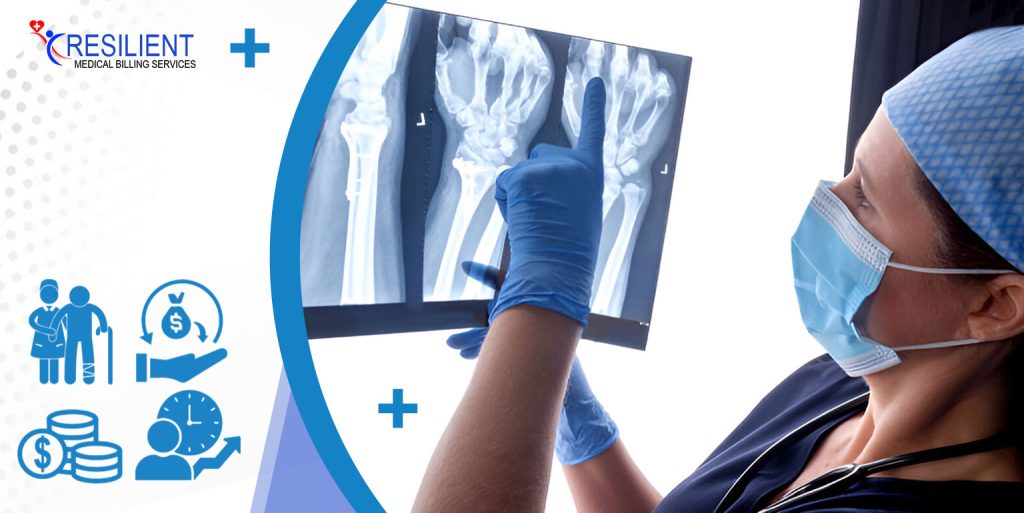Precision and speed are crucial when managing the financial side of orthopedic care. Medical billing for orthopedics isn’t just about crunching numbers it’s about keeping the wheels of healthcare turning smoothly for patients dealing with issues related to bones, joints, ligaments, tendons, and muscles.
Because orthopedic treatments are so complicated and varied, practices depend on fast and accurate billing systems to ensure that every service is billed correctly and tracked.
Medical billing for orthopedics is indeed essential for the health system. It guarantees that the healthcare providers are equally compensated, which is critical for sustaining the practice. Legal requirements, payment sanity, and errors such as claim denials and audits require accurate billing. As discussed before, accurate billing conquers the last barrier of trust, explicitly educating a patient about how much he must pay.
Understanding Medical Billing for Orthopedics
Medical billing for orthopedics refers to the sections of claim submissions for cleaning such services and procedures. It encompasses coding the diagnosis and treatment procedures, submitting the claims to insurance companies, and getting the right amounts for orthopedic services.
Orthopedic medical billing entails an understanding of orthopedic procedures, codes, and billing characteristics to properly code and bill for the services delivered and entitled to. This course also entails identifying and addressing issues concerning claim rejections, tackling patients’ outstanding bills, and meeting legal requirements or guidelines regulating insurance and the health sector.
Understanding Orthopedic Coding
Orthopedic coding translates the medical services, procedures, and diagnoses related to orthopedic care into standardized codes used in medical billing. These codes are crucial for the submission of insurance claims and for ensuring that healthcare providers are reimbursed for the services they render.
Orthopedic coding uses ICD-10 and CPT codes. ICD-10 codes describe diagnoses, while CPT codes describe operations. ICD-10 code M17.11 represents unilateral primary right knee osteoarthritis, while CPT code 29881 describes arthroscopic partial meniscectomy.
CPT Codes for Orthopedic Surgery
Orthopedic surgery treats bones, joints, ligaments, tendons, and muscles. Correct coding for these operations is essential for invoicing and insurance reimbursement. Orthopedic surgery CPT codes describe these operations thoroughly.
CPT Codes for Orthopedic Surgery
- Arthroscopy: 29806 and 29820.
- Fracture Repair: 25600 and 27506.
- Joint Replacement: 27130 and 27447.
- Spinal Surgery: 22612 and 63030.
- Reconstructive Surgery: 20610 and 20936.
Orthopedic Consultation CPT Code
Orthopedic consultations are essential for diagnosing musculoskeletal problems and planning how to treat them. Correctly coding these talks ensures the right amount of money is billed and shows how complicated the services are.
A standard CPT code for an orthopedic appointment is 99241. This code means an outpatient consultation for a new or existing patient in an office or other setting, usually lasting 30 minutes.
This code is used for initial consultations where an orthopedic expert looks at the patient’s condition, discusses treatment options, and reviews the patient’s medical history.
Changes to Consultation Codes
CMS discontinued consultation codes (99241—99245 for outpatient and 99251—99255 for inpatient) in 2010. Some payers still utilize CPT codes. Due to uncommon use, CPT codes 99241 and 99251 were eliminated in 2023.
Currently, four levels of medical decision-making match the four levels of office/outpatient and hospital talks. The transfer of care coding suggestion has been withdrawn, and CMS has no plans to amend its consultation approach.
If the consultation requirements were completed, consultation codes might be used for patients the practitioner had visited before. This flexibility helped describe the consultative services.
Common Modifiers in Orthopedic Billing And When to Use Them
Modifiers modify a service or method without affecting its definition or code. Preventing claim denials and ensuring proper reimbursement requires knowing when and how to apply these modifiers.
1. Modifier 25
Significant Evaluation and management by the same doctor on the same day as the procedure or other service.
When to Use: When a patient needs a significant and separate evaluation and management (E/M) service on the same day as a minor surgical treatment or other service, modifier 25 is used. For instance, if a patient comes in for a follow-up visit and the doctor finds a new disease that needs more testing during the same visit, Modifier 25 should be added to the E/M service code.
2. Modifier 59
Distinct Procedural Service.
When to Use: This modifier is used when two or more procedures are conducted on the same day but differ in process, location, or treatment area. Without modifier 59, several methods may be bundled under one code, lowering reimbursement. If an orthopedic surgeon performs a knee arthroscopy and fixes a shoulder condition, Modifier 59 indicates that these are independent procedures.
3. Modifier 50
Bilateral Procedure.
When to Use: When the patient has the procedure done on both the right and left side at the same visit, use modifier 50. This is seen in bilateral knee arthroscopy among orthopedic surgeries. The usage of this modification adequately compensates both procedures for the work they are doing.
4. Modifier 76
Repeat Procedure or Service by the Same Physician or Other Qualified Healthcare Professional.
When to Use: When the same doctor performs the same procedure twice in one day, modifier 76 is used. Modifier 76 will be applied to successive imaging codes if a patient needs repeated imaging of the exact location owing to problems or unclear results.
5. Modifier 22
Increased Procedural Services
When to Use: When there are issues that prolong the time that the surgeon is in the operation theater or when more complicated cases lead to more surgeries with undesirable outcomes, then this modifier is applied. Any modifications, particularly Modifier 22, should be fully explained in the patient’s chart to justify its complexity and time-consuming nature. Fracture repairs that require extra work beyond compounding the fractured part may be considered.
Common Orthopedic Procedures and Their Corresponding Codes
Orthopedic practices commonly perform a variety of procedures, each associated with specific codes:
Joint Replacement (Arthroplasty): Total hip replacement is reported by code 27130, and total knee replacement is reported with code 27447. Such procedures are usually practiced in cases of severe arthritis or injury.
Fracture Care: CPT code 25607 describes the following treatment of distal radius fracture, one of the most popular in orthopedic medicine.
Arthroscopy: This noninvasive process has been applied to diagnose and treat most joint complications. For instance, arthroscopic knee surgery with meniscectomy is CPT code 29881.
Spinal Surgery: An example of such code is 22845, which relates to spinal instrumentation, a procedure frequently used in conditions such as scoliosis, pops, or herniated discs.
Importance of Accurate Medical Billing for Orthopedics Practices

For several reasons, orthopedic companies need to make sure their billing is correct:
1. Revenue Integrity
Correct billing ensures that the practice gets paid in full for its services. It is essential for the business to stay financially stable and provide high-quality care.
2. Regulatory Compliance
Orthopedic companies must follow strict rules about how they bill. Legal problems, like fines or penalties with wrong billing or coding, can be avoided by accurate pricing.
3. Satisfied Patients
When billing is done correctly, patients get clear and correct information about their financial responsibilities. This openness reduces confusion and makes patients happier, which is essential for keeping a good image.
4. Operations That Run More Smoothly
If orthopedic offices can cut down on billing mistakes, they can streamline their administrative tasks, spend less time fixing them, and spend more time caring for patients.
The Role of Medical Billing For Orthopedics Practices- Why Specialized Billing Matters
Orthopedic practices encompass a host of procedures/ interventions that include joint replacements and spinal surgeries, among others, and entail accurate and unique billing. While general billing is restricted to collecting the patient’s medical bills, orthopedic billing requires understanding special codes and modifiers to reflect complicated procedures.
Specialized billing means that every service is billed perfectly and does not involve a high risk of denial of claims. Medical billing for the orthopedic specialties is essential in optimizing a practice’s billing cycle for success.
It interferes with cash flow as coding or documentation may cause delays or underpayments. Thus, successful billing is not just a luxury but a life-and-death matter for orthopedic practices because the procedures can be expensive and intricate. That is why specific billing specialists can recognize these nuances and guarantee that the practices are paid correctly and on time, which contributes to practices’ sustainability in the long run.
Common Billing Errors and How to Avoid Them
If addressed, simple orthopedic billing mistakes can add up to a hefty amount. Unscrupulous use of CPT codes, derisory record keeping, and offenses under the billing laws are well-known. Such mistakes lead to claim denials, delays, and audits that take time, money, and effort to correct in practice.
All these can be prevented by ensuring billing staff is equipped with the current laws and coding standards within orthopedic offices. As said earlier, coding audits identify problems that may arise before claims are made. The orthopedic billing software helps minimize the mistakes that could be made during the billing processes and enhances the quality of the bills produced.
Why Outsource Medical Billing For Orthopedics?
Medical billing specialists offer various benefits for outsourcing medical billing for orthopedics. These orthopedic billing firms specialize in complex coding and high-volume claims. Outsourcing allows organizations to acquire this expertise without the cost and resource needs of an in-house billing team.
Outsourcing minimizes errors and increases efficiency. Professional billing firms handle claims quickly and accurately using cutting-edge technology and trained coders and billers. This speeds up the revenue cycle and decreases claim denials, ensuring clinic cash flow stability. In outsourcing medical billing for orthopedics, practices focus on patient care while experts manage billing.
Conclusion
The revenue structure of orthopedic practices dramatically depends on proper medical billing. Specialized billing is a way of depicting complex activities and the patterns of revenue cycles, and it also helps avoid instances where there is an incidence of wrong billing, which costs a company a lot of money. The manual invoicing process can be made efficient and effective with the help of proper technical application of best practices followed in orthopedic clinics.
Outsourcing medical billing for orthopedics practices to a well-trained medical billing company, such as Resilient MBS, will produce desirable results. This fast-growing orthopedic billing firm delivers professional orthopedic billing while you perform your function to provide unmatchable care for your patients. Call Resilient MBS today to find out how your clinic can increase your practice’s revenue while becoming financially secure.










